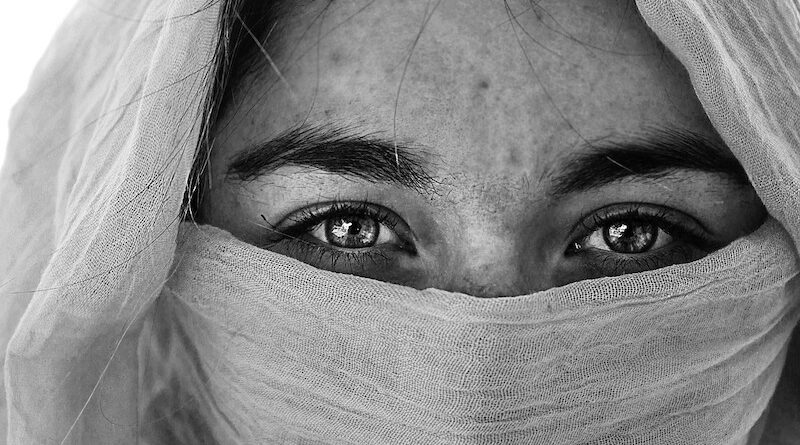Taliban have continued to impose several restrictions on women’s movement and bodies since their takeover in August 2021. They have already banned girls from attending school beyond the 6th grade and the recent move of banning women from universities is an egregious act of continued subjugation in the name of religion. According to Afghanistan’s ministry of higher education, female students failed to comply with gender-segregated classes and desired dress codes, therefore, their access to universities has been suspended until further notice.
“They are afraid of women, especially those who are educated, free to think for themselves, and have repeatedly challenged their authority,” says twenty-year-old Zolal Rahimi, a law student who was at her home when she learned about the ban through social media.
“It was very hard to process. I, along with my friends also went to the university to confirm the news but the guards didn’t let us in. It felt like all my dreams had been shattered and the world was just watching in silence,” expresses Zolal.

Twenty years old Zolal Rahimi, a student of Law and Political Science in Kunduz University.
Zolal is enrolled in the faculty of Law & Political Science at Kunduz University where female students were taught in the morning session while male students were taking the afternoon classes. Hijab and head coverings were part of a compulsory dress code which was checked daily at the entrance before they were allowed to enter the university. Moreover, female students could only be taught by female teachers, but since there were no female teachers in her faculty already, male teachers were allowed to teach them, but the teachers and students were allowed to have limited conversation even during lectures. Furthermore, students weren’t allowed to discuss politics and were instructed to leave the university immediately after classes ended.
“We followed all their instructions because we just wanted to learn but they did it anyway since they were just looking for any excuse to deny us our right to education,” says Zolal.
Struggling to survive
Many of the Afghan girls have already been banned from attending high school, Zolal’s younger sister was also one among them. Now the recent move has extinguished a rare source of hope for many others too. They are distraught and Zolal fears that many of them may even offer themselves up for marriage either forcibly or to help alleviate the financial load.
“It had happened before, when the Taliban barred women from stepping foot on university shortly after they seized power, many of my friends who were very talented, decided to drop out and get married,” tells Zolal.
Some women are making desperate decisions to survive, while others can no longer imagine surviving in their own country. Asked what Zolal thought would happen to her if she stayed in Afghanistan, she says: “I don’t want to stay here any longer. I am a law student and I have a lot of potential. I can have a better future. But if I stay here, I will probably be killed too.”
Undaunted amidst danger
Many women demonstrated across various cities in Afghanistan against a Taliban order banning them from universities. Protestors also marched through the streets of Kabul, raising banners and slogans against the restriction on women. Dressed in a long black abaya and a check scarf with her face mask secured, twenty-six-year-old Malalai Hashemi, was also involved in the protest. She told me what the Taliban did to disperse the protestors,
“We were beaten badly and many of our participants were also arrested. One of them even pointed his gun towards me and wanted to shoot me but he didn’t,” informs Hashemi. “They couldn’t stop our protest and we continued to chant against them until their Rangers surrounded us and some of the women appeared out of nowhere,” she adds.
Female members of the Taliban also joined the protest and were difficult even to identify. One of them tried to arrest Hashemi too but she managed to evade being taken into custody, “She held my hand and told me not to move. At first, I thought she is one of us and wanted me to stay but a few moments later I realized that she was a Taliban supporter. I pulled my hand back from her and ran to the nearest clinic,” tells Hashemi.
She hid in that clinic for almost an hour and waited for the Taliban to leave the area, but when they did not leave, she changed her scarf, which was in her bag, and escaped, “That scarf saved me and I came home safely,” adds Hashemi.
She managed to escape from there but still fears for her life, “I can’t just go out in public places without covering myself head to toe, because I am afraid the Taliban may recognize me and they may arrest me,” expresses Hashemi.
These courageous Afghan women are paying a high price for speaking out. Yet, despite all the hardships, they are determined to fight for their survival, “we will never, and under no circumstances, stop asking for our rights. We will fight, resist and continue our battle,” she says fiercely.
The right to education is one of the most important rights Islam granted to women. The first revealed to our Prophet Muhammad (PBUH) contained the commandment to seek knowledge. The Holy Prophet (PBUH) said, “Acquisition of knowledge is binding on all Muslims (both men and women without any discrimination).” How then, can the Taliban, prevent women from fulfilling what is otherwise seen as a religious obligation upon them?
“Taliban’s ruling is not in accordance with Islamic law. They have their own culture and they follow their own path according to which they even want to take away our right to breathe,” she added, “This is much like the pre-Islamic era when the people used to bury their baby daughters alive.”
Continued instrumentalization
In Afghanistan, women’s bodies have been instrumentalized for political ends. Sometimes Taliban treated them as a territory to exert control and impose their government on. While at the other time, the U.S. and its allies presented them as a justification to invade. Western powers have epitomized Afghan women as a symbol of sociopolitical progress only to leave them at the mercy of the Taliban so they could rule over and roll back whatever achievement these women had gained.
“It’s always a fact with all the revolutions that they want to change the disenfranchised group’s life for better or worse and unfortunately in Afghanistan It has always been the women who have been used as a symbol of progress and then the symbol of Islamization as well and the Taliban are just exerting that,” says Obaidullah Baheer, a lecturer at the American University of Afghanistan in Kabul and rights activist.
Roots of Talibanism
The Taliban’s version of Islamic law is considered idiosyncratic and excessively punitive in the eyes of most other Islamic authorities. Some people believe that it is because the tribal codes of Afghanistan are embedded in their ideology which defines a narrow place for women. Baheer refuted the popular belief and said that the Taliban’s vision for Afghanistan is not the tribal vision of Afghanistan. “Life in the villages, especially between the genders, is quite mixed. Women are capable contributors to the well-being of their households, their income, to their farming. The view that Taliban reflect is a very niche view of the world from the madrassa system that is ultra-conservative even for the village environment that exists in.”
Hardliners took the reins
During the peace negotiations, the Taliban had offered gentler rhetoric and made certain pledges to honor human rights, particularly women’s rights, with a vague caveat “as permitted by Islamic law”. In fact, western powers were also banking on the fact that the Taliban have changed. However, the reality turned out to be in sharp contrast to expectations. Some people believe that there is a divide between ultra-conservative and the less conservative Taliban and that those who had made the pledges never came to power, rather the ultra-conservatives took over the rein of the system. While Baheer blames the moderates or the less conservatives for being passive, “They (less conservatives or moderates) really haven’t come through or taken a stand for the things they claimed they believed in. So, the Afghan nation has been thrown to the conservative wolves.,” laments Baheer.
The application of Sharia which is based on the Taliban’s own views of Islamic governance has always been harsh on women. The world had seen their views on what Islam permitted which led them to strip many of people’s basic rights during their extremely repressive 1996-2001 rule. Despite having a history of oppression, they’ve been trusted again. Consequently, their latest actions that stem from a dichotomy that sees the idea of women empowerment and Islam as irreconcilable are causing great harm to the most vulnerable.
“In the past 20 years, they built an impression that all the progress which was made on women’s rights was western agenda and was meant to liberalize the society. Therefore, now they are cracking down on it and reversing all the damage caused,” tells Baheer.
Is recognition still a priority?
However, many nations have made recognition of the Taliban conditional on compliance with human rights, including the protection of the rights of women. Yet, despite expressing their expectations to secure international recognition driven by their crucial economic needs, the Taliban are not demonstrating the willingness to meet the conditions put forward by western and regional countries, “It seems that the mood within the leadership now is that international recognition is elusive anyway and they can go ahead and do whatever they need to do without worrying about the consequences. There’s another view that suggests that the Taliban have a very different approach to rationality where they take decisions based on their metaphysical lens. Therefore, they do not care what financial repercussions of policies are as long as they feel like they are living by the book and they are living up to the word of God,” says Baheer
The course ahead
Afghan women voiced their concern prior to the takeover, given the insurgent group’s history of discrimination and assault on women. Their gynophobic misogyny was already evident from the absence of women representation in the Taliban’s delegation during peace talks, which no one felt the slightest apprehensive about. Eventually, they reneged on the promises that they made before coming into power. The world should now go beyond a mere condemnation over their suffocating crackdown.
No country has recognized the Taliban as the legitimate governing authority of Afghanistan yet. The recognition and normalization are linked to concerns over security and terrorism. Besides, they should also unequivocally make recognition of the Taliban government conditional upon its policies and practices pertaining to women. Moreover, Muslim countries have a vital role to play. Political leaders as well as scholars from the Muslim world should fervently communicate to the Taliban and the Afghan people the true interpretation of women’s rights in accordance with Sharia. Furthermore, the international community should make a collective effort to empower Afghan women and their male counterparts by providing financial as well as moral support to civil society especially those who facilitate women. Afghan women are their own best advocates yet they need support. Civil society and the leaders of other countries should continue to express their support for Afghan women, and provide them the platforms to raise their voices. Meanwhile, engage the people within the Taliban movement, those who are openly calling for the ban to be rescinded, to convince the Taliban to reinstate it.
Countries can offer women access to their learning platforms. Some have even done so and offered free access to their digital learning platforms and scholarship programs to help these women continue their education. Pakistan can also allow Afghan female students to complete their degrees in its public universities.
The world needs to be concrete against institutionalizing large-scale and systematic gender-based discrimination and violence by the Taliban and their statements must translate into actions by ensuring the inclusion of Afghan women. These women know what they want and they also know the price of the “knowing” yet they would never settle for less. The world mustn’t either.
You can reach Hira @ Twitter: @HiraSaeed06
Main image: Image by Pexels from Pixabay











